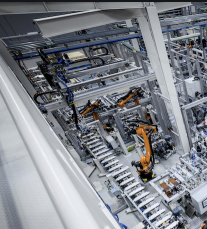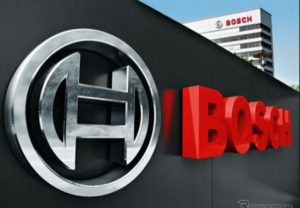Here’s the second part of the feature on what’s next for electric vehicle batteries. This time, the focus is on battery manufacturer partners for a few of the top selling global EV models.
Tesla Model 3 getting batteries from new suppliers
Tesla is the top selling electric vehicle brand in the world, and is doing well in four EV segments — sedans, SUVs, compact cars, and sports cars. Much of that comes from the power under the hood. The hp and torque can send you on a silent rocket launch  when you take a drive. The battery packs play a vital role in keeping them charged for long distances and staying dependable, longer than what competitors offer. The battery cells had been exclusively manufactured by Panasonic, and the battery modules and packs by Tesla; but that’s starting to change.
when you take a drive. The battery packs play a vital role in keeping them charged for long distances and staying dependable, longer than what competitors offer. The battery cells had been exclusively manufactured by Panasonic, and the battery modules and packs by Tesla; but that’s starting to change.
Tesla has reached a new three-year deal with Panasonic for battery supply at its Gigafactory in Nevada. The two partner companies made that facility the largest lithium-ion battery factory in the world. Last year, Tesla started breaking off with Panasonic by limiting Model 3 production with the Japanese company. Tesla started making moves to build its own batteries. This year, there was an announcement of the first million-mile battery cell that will be launching in the China market. It’s being developed with a new partner, China’s Contemporary Amperex Technology (CATL), the world’s largest lithium ion battery maker. China is an excellent market to be in, with the China Association of Automobile Manufacturers reporting that new energy vehicle sales were up 19.3 percent in July and the overall market rebound continues.
Tesla vehicles produced in Gigafactory Shanghai are powered by battery cells built by LG Chem and CATL. South Korean company LG Chem expects its battery share to grow significantly, with Tesla’s business in China being part of it. The battery maker reportedly secured a large order of batteries from Tesla in July due to high demand, and Tesla’s inability to produce enough batteries on its own. Besides China production, LG Chem may be changing over production lines in South Korea to produce more batteries for Tesla.
BAIC EU-Series bringing in new partner
China-owned carmaker BAIC Motor, the parent company of the BJEV and Senova brands, has been getting its EV batteries from China’s third largest battery maker, Guoxuan High Tech. Guoxuan follows first-place CATL and second-place BYD for China’s new energy vehicle battery market share.
BAIC will be adding SK Innovation’s NCM 811 cells to its EVs. SK Innovation Co. is based in Seoul, South Korea, and is primarily known for being a petroleum refining company. It also supplies batteries to Volkswagen and Ford. The BAIC deal is expected to start sometime during the second half of 2020, with the lithium-ion cells being produced at SK Innovation’s first plant in Changzhou, China. It will be owned by a wholly-owned joint venture between the two companies and Beijing Electronics.
Nissan Leaf stays with AESC under its new owner
Nissan has always taken a slow and conservative approach to producing, selling, and developing changes to its stalwart Leaf model. The battery pack has been made by its former subsidiary, Automotive Energy Supply Corporation (AESC). The Japanese maker sold most of AESC to Chinese renewable energy company, Envision Group, in 2018. Nissan still holds a 20 percent stake in AESC. The 2018 deal also included Nissan selling Envision Group its battery manufacturing plants in Tennessee and in Sunderland, England.
A production version of Nissan’s next EV, an electric SUV based on the Leaf, is expected to begin arriving in showrooms in 2021. The company expects it to sell at a higher volume than the Leaf. Envision Group has plans in place to triple AESC’s lithium-ion cell manufacturing capacity. The company hopes to be ready for producing batteries for Nissan’s next-generation EV, and to continue supplying the Leaf.
In May, Nissan, Renault, and Mitsubishi reaffirmed their automotive Alliance, and will be increasing sharing platforms, technology, and production. The Renault-Nissan-Mitsubishi Alliance had been in doubt after the arrest in Japan of former chairman Carlos Ghosn, who’d been a champion of EVs for the brands. In Europe, B-segment cars will be one of the segments in the Alliance and includes the Renault Clio and Zoe EV, Nissan Leaf, and upcoming Ariya EV SUV. Renault takes the lead in Europe under the Alliance, with Nissan being the lead brand in China, North America, and Japan; and Mitsubishi leading in the South-East Asia (ASEAN) and Oceania regions (several islands including Australia).
BYD supplies its own batteries for BYD Yuan / S2 EV
BYD supplies its own electric vehicle batteries, and was ranked third in the world for lithium ion battery producers during 2018, following No. 1 LG Chem and and No. 2 CATL (in a Bloomberg study). The company supplied batteries for its 229,506 electric vehicles sold in 2019.
That will expand to include Ford Motor Co. On June 1, a document was filed on the website of China’s Ministry of Industry and Information Technology following official protocol. BYD batteries will support Ford’s electric vehicle production in China. Ford’s China joint venture with Changan Automobile is seeking government approval to build a plug-in hybrid EV model equipped with BYD’s batteries, according to the document. The deal will also include BYD’s power management devices that Ford will use.
Renault Zoe sharing large plant with VW Group
Renault is acquiring EV batteries for the Zoe electric small car from LG Chem’s Wroclaw, Poland, facility. The South Korean battery maker hasn’t shared figures on the plant’s output, but it may be on its way to become Europe’s largest EV battery production facility. Along with the Zoe, batteries are being produced for Volkswagen Group electric vehicles such as the Audi e-tron and Porsche Taycan. LG Chem began mass production of its NCM712 batteries in the first quarter of 2020.
Hyundai Kona EV being sent to global markets
Hyundai has been more quiet about its presence in electric vehicles that fuel cell vehicles. It’s Ioniq Electric was given more attention when it launched in the US in 2016. The company just announced the launch of its new Ioniq brand dedicated to battery electric vehicles, “opening a new chapter as a leader in the era of electrified mobility.” That means it will be marketed more as its own sub-brand focused on all-electric and not just one of its offerings in all-electric, plug-in hybrid, and hybrid variations.
But its Kona EV has been doing pretty well in sales. It started in South Korea and Europe in 2018, with a market debut in the US and Thailand in 2019. In the spring of 2020, Hyundai began production and started delivery of the Kona Electric in Europe at its Hyundai Motor Manufacturing Czech (HMMC) manufacturing plant.
The company rolled out a new EV in China in early 2019, called the Hyundai Encino EV. The two models have small differences in trim, but overall they’re basically the same electric crossover sport utility vehicle.
As for batteries, the company will be going with CATL in China and LG Chem in other markets. Hyundai and LG Chem are in talks about possibly establishing an EV battery manufacturing joint venture in Indonesia, a person familiar with the matter told Reuters in late June.
BMW i3 sticks with Samsung SDI
Samsung SDI, one of South Korea’s top three battery making companies, in November 2019 signed a 10-year contract with BMW Group to supply 2.9 billion euro ($3.2 billion) worth of lithium-ion battery cells to the German automaker and its ambitious EV model launch strategy over the next decade.
The battery maker’s fifth-generation EV batteries are expected to power some of the new 25 environment-friendly vehicles models including 12 all-electric vehicles BMW pledged to roll out by 2025. In 2014, Samsung SDI became the exclusive battery supplier for BMW’s i3 electric car. That year, the two companies expanded their agreement to include developing next-generation materials and EV technology — which has ended up in a wide variety of plug-in vehicles offered under the BMW brand.
Solid-state batteries a big part of the Fisker and VW relationship?
Last year, Fisker Inc., launched its Ocean model, with plans to roll out the $40,000 all-electric SUV in 2021. CEO Henrik Fisker said the solid-state battery that will go into the Ocean can produce 2.5 times the energy density that lithium-ion batteries can, at perhaps a third of the cost. The Volkswagen partnership will be part of it, but there’s likely to be other announcements with automakers and technology suppliers.
The founder is emphasizing that Fisker, Inc., is pursing a different business model than Tesla and many other EV startups have tried. Last month, Fisker Inc,. reached a deal to go public by merging with a special purpose acquisition company (SPAC) backed by Apollo Global Management. Fisker is cutting out the huge capital outlay needed to become a carmaker. The company has been is in talks with Volkswagen to use its modular EV platform and to assemble its vehicles at a VW plant in Europe.
But where is the solid-state battery coming from? Will they be sharing the same supplier partners? Is VW jumping into the solid-state battery world as well? It seems that QuantumScape could be part of it, with VW recently sinking another $200 million in the solid-state battery company.
VW’s relationship with the solid-state battery company goes back to 2012. In 2018, the two companies forged a joint venture to accelerate the development of solid-state battery technology that can be produced at a commercial scale. The German automaker placed $100 million in the initial investment in September 2018. The company hopes to accelerate that work through the recent $200 million investment.
And in other news……….
A California judge ruled yesterday afternoon that Uber and Lyft must classify their drivers as employees, a decision that could affect many gig workers well beyond the two ride-hailing giants. The ruling will be stayed for 10 days, and then a preliminary injunction will take hold. Uber and Lyft say they will be filing emergency appeals during that 10-day window. This comes from a lawsuit filed in May by California Attorney General Xavier Becerra and the city attorneys of Los Angeles, San Francisco, and San Diego. The suit made the case that the drivers were misclassified as independent contractors when they should be employees under the state’s AB5 law that went into effect on January 1st. California later filed a motion for a preliminary injunction that would change the driver classification immediately. Superior Court Judge Ethan Schulman ruled yesterday that Lyft and Uber drivers should be given the same protections and benefits under labor law as other full-time employees of the two companies.
Leading refuse company Republic Services is bringing in fuel cell electric vehicles. The company has agreed to purchase 2,500 of these collection vehicles from Nikola Corp., with the potential for up to 5,000 orders. Republic Services said its the largest truck order ever for its fleet of approximately 16,000 collection vehicles. The order will be contingent on initial testing that’s expected to begin in Arizona and California, with wider-scale testing in 2022 and full deployment by 2023. The collection vehicles are said to have a 150-mile range, up to 720 kilowatt hours of battery capacity, and the ability to collect 1,200 cans with one charge. Nikola’s chief told Wall Street Journal that he expects each vehicle will cost under $500,000.

